Wondering how long weed stays in your body? The answer isn’t one-size-fits-all—it depends on how often you use, your body fat, metabolism and how you consume it. In this article we’ll break down how THC is processed, the detection times for different drug tests and what factors affect how quickly THC clears out.
For a quick summary, this video explains how long cannabis stays in your system.
What is Marijuana Use?
Marijuana—also known as weed or cannabis—is one of the most used substances in the world and its effects on the body can vary from person to person. Whether you use it occasionally or regularly, knowing how long weed stays in your system is important especially if you’re taking a drug test for work, school or medical reasons. Employers often require drug tests as part of their hiring process and knowing what to expect can help you make informed decisions.
When you use marijuana the main psychoactive ingredient, THC, is absorbed into your bloodstream and stored in your body’s fat. Over time your body breaks down THC into THC metabolites which are what most drug tests look for. These metabolites can stick around in your system long after the effects of cannabis have worn off and how long they stay depends on several factors—how often you use, body fat percentage and type of drug test being used.
Urine drug tests are the most common way to detect marijuana use but blood tests, hair tests and saliva tests are used in different settings. Each test has its own detection window meaning the amount of time it can detect THC metabolites after your last use. For example urine tests can detect THC metabolites up to 30 days in heavy users, blood tests usually only detect them for a day or two. Hair tests can show evidence of cannabis use up to 3 months and saliva tests are best for detecting recent use.
Also note that secondhand marijuana smoke can sometimes be detected in oral fluid but it’s not a reliable indicator of actual marijuana use. People with higher body fat percentage may retain THC metabolites longer making it harder to eliminate THC quickly. That’s why detection times can vary so much from person to person.Chronic use of cannabis can lead to marijuana addiction also known as marijuana use disorder. If you or someone you know is struggling organizations like American Addiction Centers offer specialized treatment programs to manage chronic cannabis use and support recovery.
In the sections below we’ll break down how long weed stays in your system, how different drug tests work and what factors affect detection times. We’ll also cover marijuana addiction, treatment options and why objective testing is important for detecting THC metabolites. Whether you’re curious how long weed stays in your system or looking to get rid of THC this guide will give you the facts.
Key Points
- THC is absorbed differently depending on how you consume cannabis which affects how long it stays detectable.
- Urine tests are the most common way to detect marijuana use, detection times vary based on how often you use and your metabolism.
- The best way to clear THC naturally is to stop using it—many detox myths don’t have scientific backing and there is no scientific evidence supporting these detox methods.
How THC is Processed in the Body
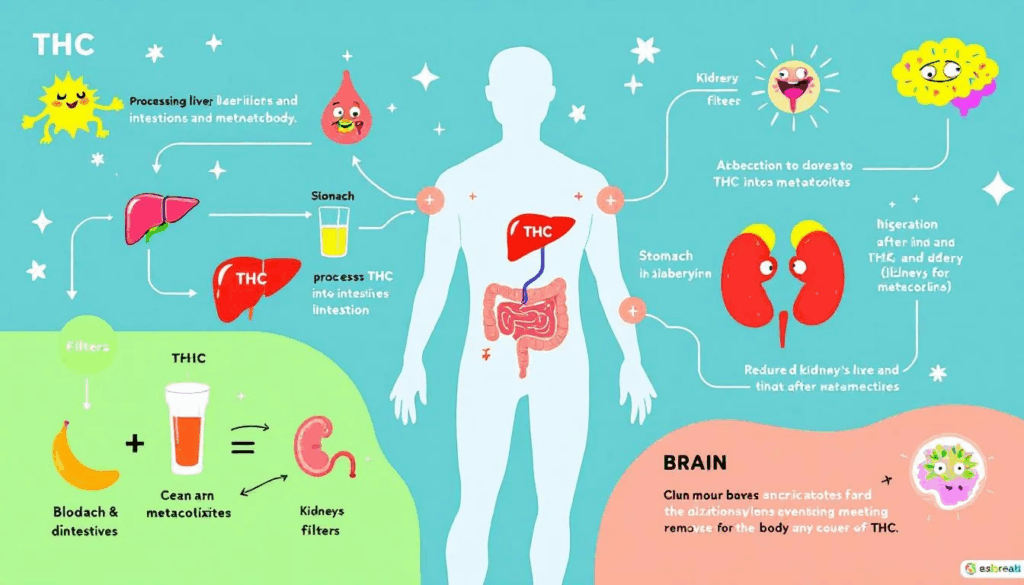
When you smoke cannabis THC—the part that gets you high—enters your bloodstream almost instantly through your lungs. That’s why you feel the effects so quickly. Eating cannabis like in edibles is a slower process because THC has to pass through your stomach and liver first where it’s broken down into other compounds like 11-OH-THC and THCCOOH.
The body process of THC involves absorption into the bloodstream, distribution to various organs, storage in fatty tissues, metabolism mainly in the liver and eventual excretion. Specifically the way the body process thc includes absorbing THC, storing it in fat cells, metabolizing it in the liver and gradually eliminating it over time.
THC loves to hang out in fat cells which is why it can stick around in your body for a while. Organs like your liver, lungs and spleen also store and process THC which adds to how long it stays.
How your body handles THC depends on how much and how often you use cannabis. Frequent or heavy use means more THC builds up in fat cells making it detectable for longer. Because of this fat storage your body takes time to fully eliminate THC. While the body processes many drugs in similar ways THC’s tendency to accumulate in fatty tissues makes its clearance from the body unique.
Detection Windows for Different Drug Tests
Different drug tests detect marijuana use over different time frames. Here’s a quick breakdown of the main types: urine tests, blood tests, saliva tests and hair tests. Drug testing is used in workplaces and medical settings to detect drug use including cannabis consumption. Each has its own detection window and sensitivity. Knowing these can help you understand what to expect whether it’s for a job screening or medical test.
The time these tests can detect THC depends on how often you use and your metabolism. Urine tests can detect marijuana use for weeks while blood tests only detect recent use.
Urine Tests
Urine tests are the most common way to test for marijuana because THC stays in urine for a while. A urine test detects THC metabolites that are excreted through urine and the detection window depends on how often cannabis is used. If you’ve only tried cannabis once it might show up for up to three days. But for regular users THC metabolites can hang around in urine for 30 days or even longer—sometimes up to 70 days. Chronic use can extend the detection window for THC metabolites in a urine test.
Employers use urine tests because they have a longer detection window helping to keep workplaces drug-free. These tests are good for detecting past marijuana use especially in frequent smokers.
Blood Tests
Blood tests detect THC for a much shorter time—usually up to 12 hours after use. THC levels drop quickly after 3 to 4 hours so blood tests are better for detecting recent use like in traffic accidents rather than long term use.
Saliva Tests
Saliva tests detect THC for a short period—often the same day or up to 34 hours after use. A saliva test is a quick non-invasive method commonly used to detect recent marijuana use within hours of consumption. For frequent smokers this window can stretch to about 72 hours. Because THC can linger in the mouth after smoking saliva tests detect it longer than blood tests but not as long as urine tests. They’re used for quick roadside checks.
Hair Tests
Hair tests have the longest detection window—up to three months. A hair test is considered reliable for long term or heavy marijuana use but may not be effective for light or occasional users. They’re great for tracking long term marijuana use but might miss occasional users because the sensitivity isn’t as high. Hair samples look for THC that’s been absorbed into hair follicles from the bloodstream. While they can detect use up to 90 days back they’re less common for routine testing.
Factors Influencing THC Clearance Time
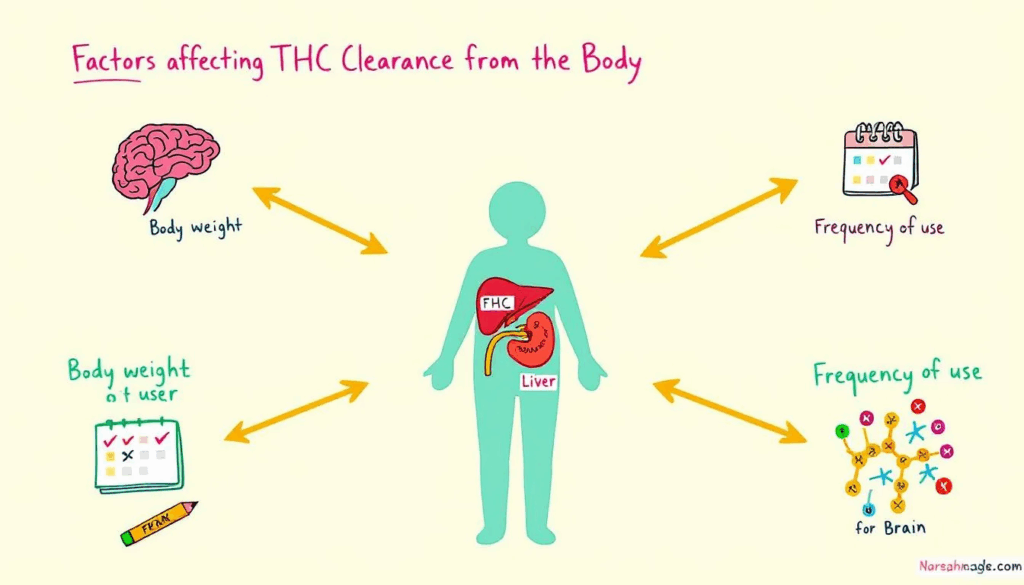
Several things affect how long THC stays in your system. Using cannabis often or heavily means THC metabolites stick around longer. This is because THC builds up in fat cells which slows down how fast your body can clear it out. Other factors such as genetics, potency of the cannabis and method of consumption can also influence how long THC remains detectable.
Body fat percentage plays a big role because:
- THC binds to fat molecules.
- People with higher body fat may hold onto THC longer.
- This makes your body mass index (BMI) and overall health important to consider.
How much cannabis you use is another key factor—larger amounts can extend the detection window making THC metabolites stay in your system longer.
Your metabolism also matters. Some people naturally process and eliminate THC faster than others. Drinking water can dilute THC in urine but doesn’t really speed up how fast your body clears it especially if you’re a heavy user.
Myths vs. Facts About Detox Methods
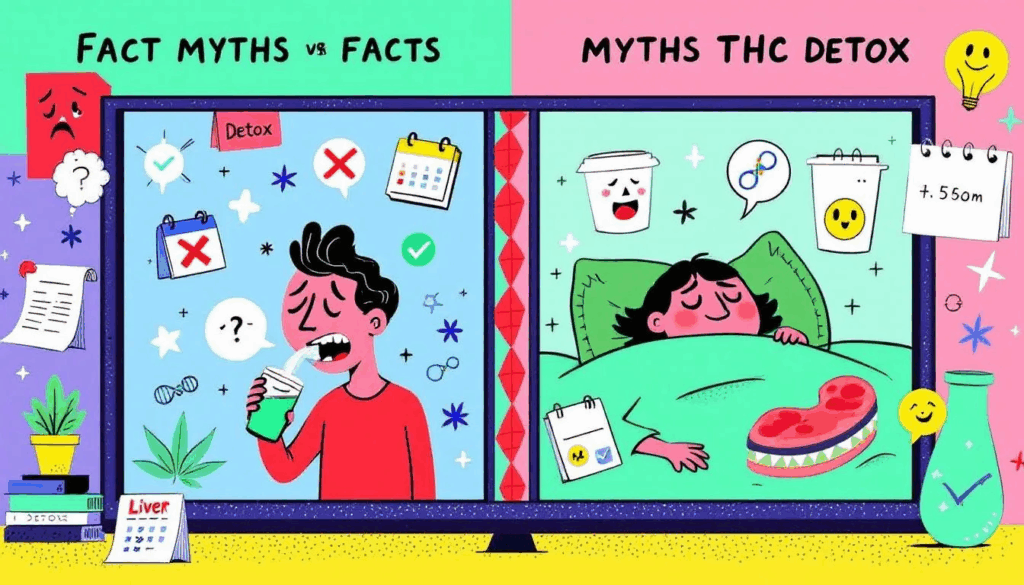
There are plenty of myths about how to detox from marijuana quickly, but most don’t hold up to scientific scrutiny. Here’s the truth:
- Drinking lots of water won’t flush THC out faster.
- Detox diets might be good for your health but don’t guarantee quicker THC elimination.
- Exercise is great overall but won’t drastically speed up THC leaving your fat cells.
It’s also important to know that some initial drug tests can result in false positives. These are usually confirmed or refuted by more accurate testing methods, such as GCMS.
The only sure way to clear THC is to stop using marijuana and give your body time to naturally detox.
Marijuana Addiction and Treatment Options
There are plenty of myths about how to detox from marijuana quickly but most don’t hold up to scientific scrutiny. Here’s the truth:
- Drinking lots of water won’t flush THC out faster.
- Detox diets might be good for your health but don’t guarantee quicker THC elimination.
- Exercise is great overall but won’t drastically speed up THC leaving your fat cells.
It’s also important to know that some initial drug tests can result in false positives. These are usually confirmed or refuted by more accurate testing methods such as GCMS.
The only way to clear THC is to stop using marijuana and give your body time to naturally detox.
Marijuana Addiction and Treatment Options
Marijuana addiction also known as marijuana use disorder or cannabis use disorder affects many people. If you or someone you know is struggling treatment options include:
- Inpatient rehab
- Outpatient rehab
- Partial hospitalization programs (PHP)
- Mental health counselingAfter detox many people move on to comprehensive addiction treatment that addresses both physical and mental health. Medical professionals can help manage withdrawal symptoms to keep you safe and comfortable.
Heavy cannabis users may require more specialized or intensive treatment approaches. For heavy or chronic users reaching out to organizations like the American Addiction Centers can be a big step towards recovery.
Will Secondhand Marijuana Smoke Show Up in a Drug Test?
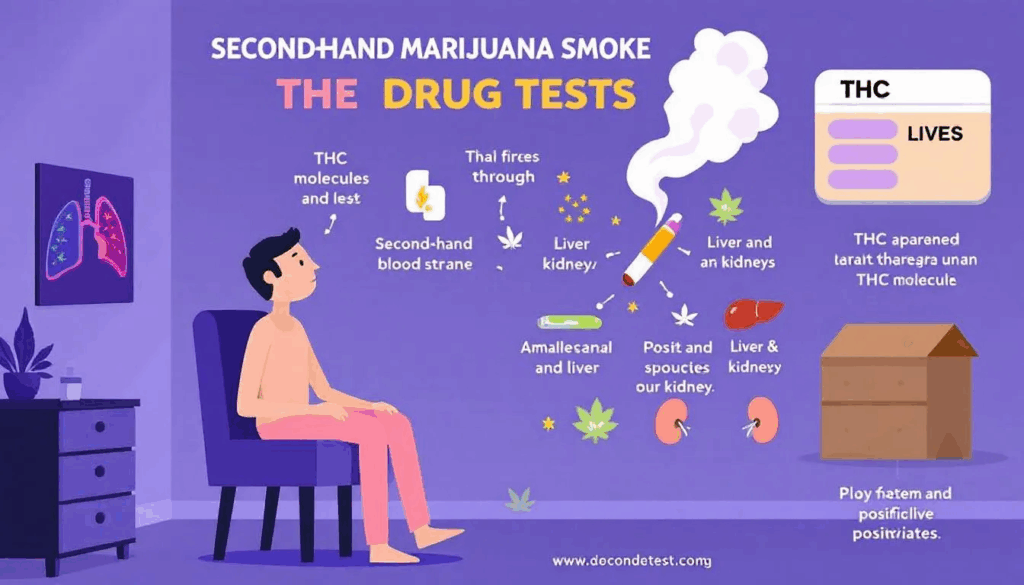
Breathing in secondhand marijuana smoke can sometimes cause detectable THC levels especially in enclosed spaces where smoke lingers. Studies show that passive inhalation can lead to measurable THC though a positive drug test from this is less common and depends on how much smoke you inhale, ventilation and your metabolism.
While it’s unlikely under certain conditions secondhand exposure might trigger a positive drug test.
How Long Does It Take to Detox From Weed?
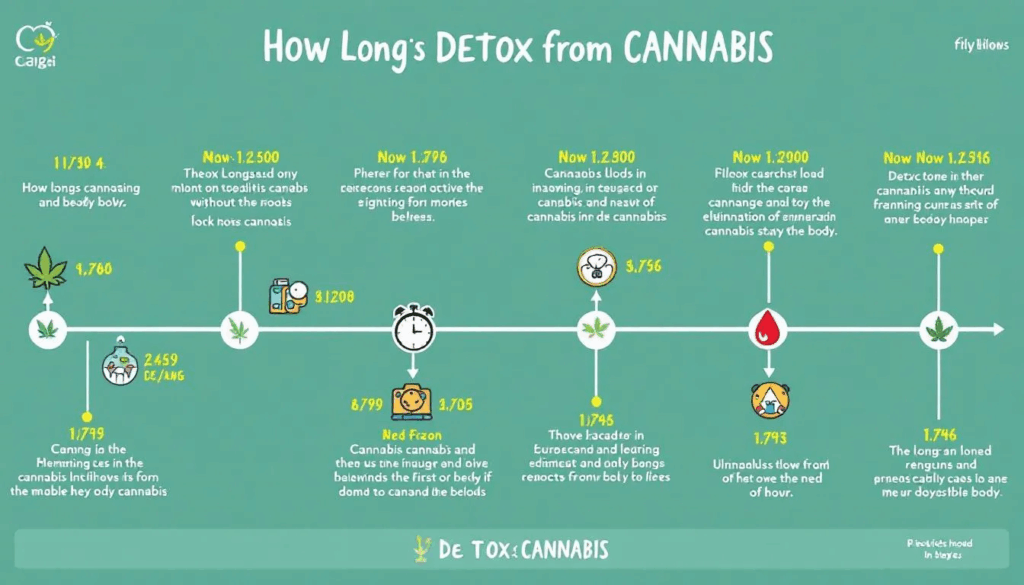
Detoxing from weed can take anywhere from a few days to several months depending on how much and how often you use. For some it can take between 5 and 65 days to fully clear marijuana. Heavy users might test positive for THC metabolites more than 30 days after their last use which raises the question how long weed stays in the system.
How long THC stays around depends on the amount and frequency of use—more frequent and heavier use means longer detection times. The half-life of THC varies lasting longer in frequent users than in occasional ones.
Detox kits aren’t a shortcut to speed up THC clearance. The best approach is to stop using marijuana and let your body clear it naturally.
Summary
Knowing how long weed stays in your system is important especially if you’re facing drug tests. Understanding how THC moves through your body how different tests detect it and what affects how quickly it clears can help you make informed decisions.
Whether you’re an occasional user or a regular smoker knowing the facts about detox and treatment options can guide you towards a cleaner healthier path. Remember the only way to guarantee THC elimination is to stop using and give your body time to detox naturally.
Frequently Asked Questions
How long does weed stay in your system?
Weed can stay in your system from a few days up to several months depending on how often you use and your metabolism. Keep these in mind if you’re concerned about detection.
Can secondhand marijuana smoke cause a positive drug test?
Yes, secondhand smoke can sometimes cause a positive test, especially in enclosed spaces with heavy smoke. It’s good to be aware of this risk if you’re around marijuana use.
Do detox kits work to clear THC fast?
Most detox kits don’t work as advertised. The only way to clear THC is to stop using marijuana and let your body detox naturally.
What treatment options are there for marijuana addiction?
Addiction treatment includes inpatient and outpatient rehab, partial hospitalization and counseling. These programs address both physical and mental aspects of addiction.
How long can THC be detected in hair tests?
Hair tests can detect THC up to 90 days which is good for tracking long term use.
Author
-
As the Medical Director at New England Psychiatric Consultants, I’m dedicated to elevating mental health care through compassionate, evidence-based practices. With a robust clinical background and leadership experience, I work closely with multidisciplinary teams to design and deliver comprehensive outpatient and consultative psychiatric services. I’m passionate about championing innovative treatment approaches and optimizing patient journeys from assessment through recovery.
Key Expertise & Achievements
-
Leadership in clinical operations, quality assurance, and regulatory compliance
-
Implementation of integrated care models that enhance patient access and outcomes
-
Expertise across mood disorders, anxiety, and serious mental illness
-
Advanced training in psychopharmacology, psychotherapy, and collaborative care strategies
Professional Approach
Driven by empathy, teamwork, and data-informed decisions, I strive to foster environments where clinicians and patients alike feel supported. Whether guiding team development, streamlining care pathways, or navigating complex cases, I take a thoughtful, solution-oriented stance. -
